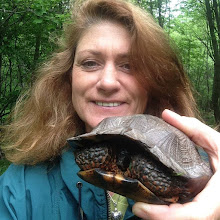HERPETOLOGY WORKSHOP
Location: New Jersey School of Conservation (NJSOC) in Stokes State Forest, Sussex County, New Jersey
Description: This course is designed to introduce college-level students to the reptiles and amphibians of the Northeast United States, the environments they inhabit, and the techniques that are used to conserve and study them in the field. Most of the course will involve hands-on field activities that allow students to get "up close and personal" with the salamanders, frogs, toads, turtles, lizards, and snakes that call the Northeast home. A small number of classroom lectures and lab activities will also contribute to the student learning experience.
The course will include:
• Discussions of reptile and amphibian natural history: their basic biology, life histories, and habitats
• Discussions on the conservation and management of reptiles and amphibians
• Reptile and amphibian identification and taxonomy
• Identification of calling amphibians by ear
• Habitat, plant, and non-herp animal identification
• Reptile and amphibian sampling, trapping, and marking/tagging techniques
• Radiotelemetry
• Reptile and amphibian tissue sampling for DNA analysis
• Collection of occupancy, relative abundance, mark-recapture, physical, environmental, and geographic data
• Field note recordation and organization
• Field photography
• Day and night surveys for reptiles and amphibians
• Hikes through several diverse northeastern habitats
• Off-site field trips to natural areas that are different from those around the NJSOC
• Participation in ongoing herpetological studies at the NJSOC and elsewhere
Cost: $750 for one week or $1000 for two weeks (fees cover food, lodging, and instruction)
Academic Credit: One to three (1-3) transferable, undergraduate credits are obtainable through Montclair State University for an additional fee. Non-credit options are also available. To receive academic credit and financial aid, participants attend the course in June, then register for the course during the fall 2016 semester.
Qualifications: Participants should be in relatively good physical shape and capable of hiking several miles in a range of conditions through moderate-difficult terrain. Above all, participants are expected to be capable of college-level work and possess a strong interest in field biology, ecology, or another closely-related discipline. Class space is limited and participants will be accepted on a first come, first served basis providing they satisfy the above preconditions.
JUNE 2017 this class is a dream come true for me. I've always wanted to go to camp, and a camp only about Herpetology.....WOW!
Thursday, May 26, 2016
Subscribe to:
Post Comments (Atom)

No comments:
Post a Comment